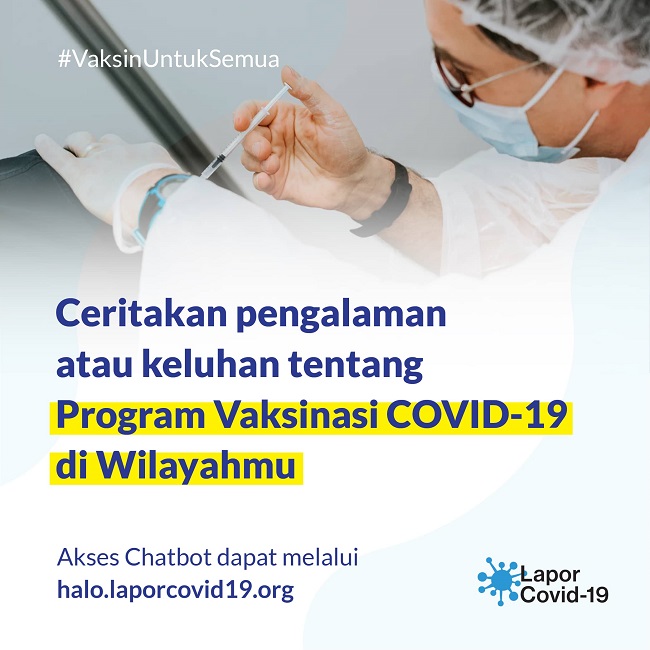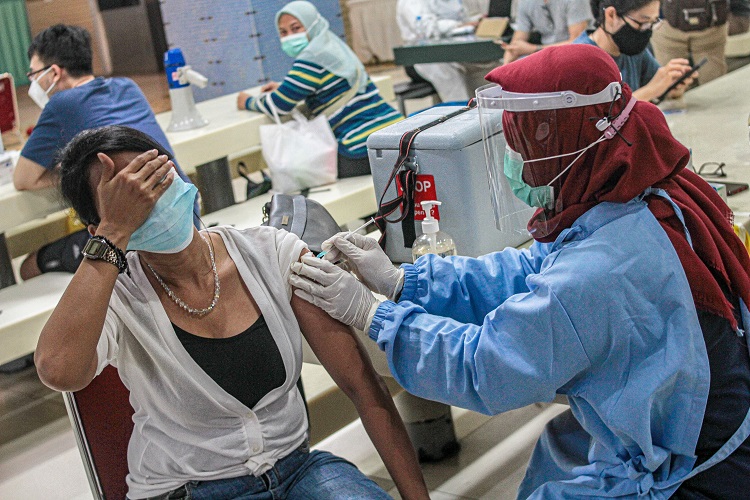In the absence of reliable government information, citizens are stepping up to share local stories on COVID-19 and keep each other informed about the state of the pandemic
LaporCovid-19
COVID-19 rates of infection in Indonesia have increased dramatically since June 2021, but accessing reliable, real-time, data on the spread of the disease has proved difficult. In recent weeks, Indonesia has been dubbed Asia’s and indeed the world’s new ‘epicentre’ for COVID-19, with the highest reported rate of daily cases in the world in recent days.
Since the beginning of the pandemic in March 2020, ongoing critiques of the government have highlighted a lack of transparency in the reporting of statistics, particularly due to low testing rates. More than 18 months into the pandemic, the concerns about underreporting remain, with tests only reaching 55.89 out of 1000 people.
As a result, the official data regarding deaths from COVID-19 fails to include thousands who have died without being counted as COVID-19 deaths, despite showing COVID-19 symptoms. Instead these deaths are listed in the official numbers under ‘probable’ deaths (see https://peta.laporcovid19.org/).
In the past two months, hospitals across Java and increasingly elsewhere, have reached their capacities and healthcare workers are overwhelmed, resulting in at least 307 health workers dying from COVID-19 in the period from early June-18 July alone.
Vaccination inequity
The country is also facing a huge challenge with vaccine inequity. Many within priority groups, including healthcare workers and the elderly, have not been vaccinated and lack access to vaccinations. The vaccination roll-out has prioritised celebrities, artists, and members of parliament along with their families. The private sector has also been given the opportunity to vaccinate employees and their family members.
Jawa adalah episentrum kematian, 70 persen dari angka kematian nasional.
— LaporCovid19 (@LaporCovid) July 19, 2021
#IndonesiaDaruratCovid19 #RSKolaps pic.twitter.com/1KzgsELyah
In the absence of reliable government information, citizens are stepping up to share local stories on COVID-19 and keep each other informed about the state of the pandemic
It doesn’t stop there, in February 2021 the Minister of Health issued a regulation to enable a program for self-funded COVID-19 vaccination, although after massive pressure from civil society including LaporCovid-19 and the World Health Organisation (WHO), President Joko Widodo finally dropped the plan.
In the absence of reliable and up-to-date information from the government, private citizens have stepped in to fill this void. This led to establishment of websites such as LaporCovid-19, a crowdsourcing site for information about COVID-19 infections, exposure sites and deaths.
Why turn to crowdsourcing?
The lack of accurate and complete information flowing through to the public via official channels, means that people will look for alternative sources of reporting and data. At the same time, this is not simply an issue of underreporting due to lack of testing across the country. Given that many people remain mobile, despite stay-at-home orders in several areas, the lack of contact tracing also means that systems for identifying and informing those at risk is also practically non-existent.
There are also political issues at play. Coordinating Minister Luhut Panjaitan has warned against criticising the government, stating at a press conference on 5 July 2021 that the government has the situation under control (though he conceded in later statements that the Delta variant had made the situation more complicated).
Journalists have unofficially reported that news agencies are discouraging reporting that reflects negatively on the government. With the public unable to rely on the government or traditional media for reliable figures and reporting of exposure sites, crowdsourcing sites are playing a crucial role in collecting, collating, and publishing information.
LaporCovid-19
Formed in March 2020, LaporCovid-19 was started by a coalition of concerned citizens who wanted to gather and share up-to-date information about COVID-19 across the country. Providing a platform for citizen reporting, the site draws on volunteer contributions to map cases as well as local stories about access to testing, vaccinations and local hotspots. Contributors can also share a range of concerns from lack of health facilities and supplies, and share personal experiences. Other data collected included cases of death during self-quarantine and also provides a space for those who have lost their loved ones to share their stories.
These first-hand experiences are not reported in official data, and so such stories are valuable in informing the public about the scale of the pandemic in the country. Though this is viewed by the government as criticism, these are much-needed competing data, providing a map to help citizens navigate through the pandemic.
The LaporCovid-19 website includes compilations of statistics including a ‘pandemic severity index’ (PSI), current case numbers, estimates of recovered cases and deaths. The site also incorporates a chatbot, as well as Whatsapp and Telegram accounts, through which citizens can send information that is then added to a ‘mapstory.’ On this page, visitors can view stories of individual experiences based on geographic location.
In addition to reporting, the LaporCovid-19 coalition is also undertaking a range of much-needed advocacy. This includes forums for combating stigma, reporting misuse of social support (bantuan sosial, BANSOS), supporting citizen journalism, and an online repository of public lectures on COVID-19.

Included in the suite of LaporCovid-19 activities is advocacy on behalf of health workers. The website features an ongoing tally of frontline workers who have perished, highlighting the very real risks they face during the pandemic. With infection rates increasing, these risks have magnified significantly. Specific efforts to support frontline workers include advocacy to ensure they receive the additional incentive payments that they are legally entitled to, and that their families receive promised government compensation should they pass away.
From the outside
For those outside of Indonesia who are closely following the situation as it unfolds, the current statistics offer a grim picture. However, while deeply concerning, accurate statistics and case tracing are essential in helping to get this virus under control. From this perspective, LaporCovid-19 and other similar crowdsourcing sites such as KawalCovid, offer important information for both tracking cases, identifying hotspots, and targeting aid and support to at-risk populations. They also offer an online forum for people to share their experiences of fear and loss.
For more information about LaporCovid-19 and to stay up to date on the latest information and data about the pandemic, visit their website: https://laporcovid19.org/.
For those in Australia, we invite you to add your name to a petition calling on the Australian government to continue to closely monitor the situation and consider increasing levels of assistance as this massive humanitarian crisis continues to unfold.
Translated by Lis Kramer
